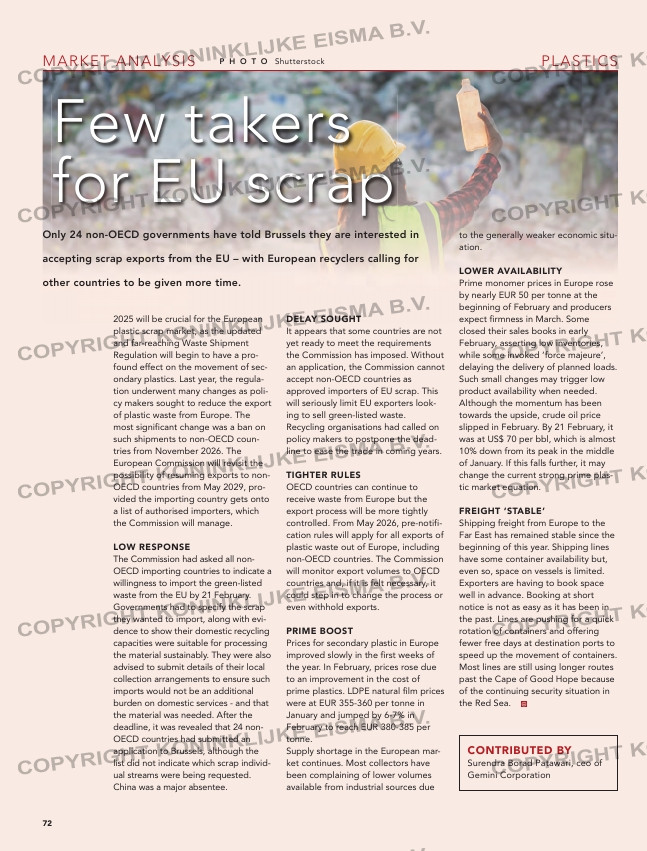Page 72 from: March/April issue 2025

72
PLASTICSMARKET ANALYSIS
Few takers
for EU scrap
Only 24 non-OECD governments have told Brussels they are interested in
accepting scrap exports from the EU – with European recyclers calling for
other countries to be given more time.
2025 will be crucial for the European
plastic scrap market, as the updated
and far-reaching Waste Shipment
Regulation will begin to have a pro-
found effect on the movement of sec-
ondary plastics. Last year, the regula-
tion underwent many changes as poli-
cy makers sought to reduce the export
of plastic waste from Europe. The
most significant change was a ban on
such shipments to non-OECD coun-
tries from November 2026. The
European Commission will revisit the
possibility of resuming exports to non-
OECD countries from May 2029, pro-
vided the importing country gets onto
a list of authorised importers, which
the Commission will manage.
LOW RESPONSE
The Commission had asked all non-
OECD importing countries to indicate a
willingness to import the green-listed
waste from the EU by 21 February.
Governments had to specify the scrap
they wanted to import, along with evi-
dence to show their domestic recycling
capacities were suitable for processing
the material sustainably. They were also
advised to submit details of their local
collection arrangements to ensure such
imports would not be an additional
burden on domestic services – and that
the material was needed. After the
deadline, it was revealed that 24 non-
OECD countries had submitted an
application to Brussels, although the
list did not indicate which scrap individ-
ual streams were being requested.
China was a major absentee.
DELAY SOUGHT
It appears that some countries are not
yet ready to meet the requirements
the Commission has imposed. Without
an application, the Commission cannot
accept non-OECD countries as
approved importers of EU scrap. This
will seriously limit EU exporters look-
ing to sell green-listed waste.
Recycling organisations had called on
policy makers to postpone the dead-
line to ease the trade in coming years.
TIGHTER RULES
OECD countries can continue to
receive waste from Europe but the
export process will be more tightly
controlled. From May 2026, pre-notifi-
cation rules will apply for all exports of
plastic waste out of Europe, including
non-OECD countries. The Commission
will monitor export volumes to OECD
countries and, if it is felt necessary, it
could step in to change the process or
even withhold exports.
PRIME BOOST
Prices for secondary plastic in Europe
improved slowly in the first weeks of
the year. In February, prices rose due
to an improvement in the cost of
prime plastics. LDPE natural film prices
were at EUR 355-360 per tonne in
January and jumped by 6-7% in
February to reach EUR 380-385 per
tonne.
Supply shortage in the European mar-
ket continues. Most collectors have
been complaining of lower volumes
available from industrial sources due
to the generally weaker economic situ-
ation.
LOWER AVAILABILITY
Prime monomer prices in Europe rose
by nearly EUR 50 per tonne at the
beginning of February and producers
expect firmness in March. Some
closed their sales books in early
February, asserting low inventories,
while some invoked ‘force majeure’,
delaying the delivery of planned loads.
Such small changes may trigger low
product availability when needed.
Although the momentum has been
towards the upside, crude oil price
slipped in February. By 21 February, it
was at US$ 70 per bbl, which is almost
10% down from its peak in the middle
of January. If this falls further, it may
change the current strong prime plas-
tic market equation.
FREIGHT ‘STABLE’
Shipping freight from Europe to the
Far East has remained stable since the
beginning of this year. Shipping lines
have some container availability but,
even so, space on vessels is limited.
Exporters are having to book space
well in advance. Booking at short
notice is not as easy as it has been in
the past. Lines are pushing for a quick
rotation of containers and offering
fewer free days at destination ports to
speed up the movement of containers.
Most lines are still using longer routes
past the Cape of Good Hope because
of the continuing security situation in
the Red Sea.
CONTRIBUTED BY
Surendra Borad Patawari, ceo of
Gemini Corporation
P H O T O Shutterstock
72_maplastics.indd 72 06-03-2025 10:01



